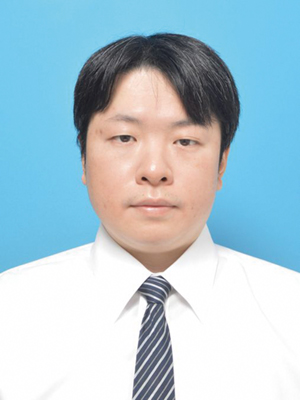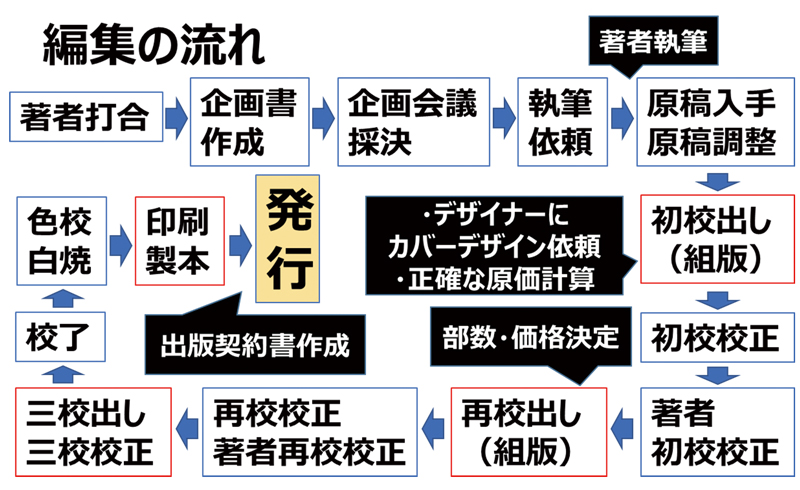Disclaimer: machine translated by DeepL which may contain errors.
Science Publishers and the Recent Publishing Industry
Shingo Ishihara (Technical Staff, Department of Earth and Planetary Science)

Compared to 20 years ago, when I was a student, the amount of reading time of university students today is noticeably decreasing. This is the result of the "Reading Time" survey conducted annually by the National Federation of University Co-operative Associations of Japan.
My previous job was as a planning editor for a long-established science and engineering publishing company. I was about to complete my fifth year as a Technical Staff and Research Associate at a private university, and when I thought about what to do next, I knocked on the door of the publisher of the science and engineering books I had read the most in my life.
After joining the company, I learned editing techniques through on-the-job training. The flow of editing is summarized in the figure below. Despite my efforts, I had no experience in editing itself, and I was in my mid-30s at the time, so I was impatient that I would not be able to match the editing skills of a seasoned editor in about five or ten years. Therefore, in order to differentiate myself, I used my science-related skills as a weapon.
The publishing industry is basically a humanities world. The company I worked for was a science and engineering publisher, and editors with expertise in a certain field tended to be in charge of books in that specialty, i.e., IT books were handled by information science graduates, and electrical books by people with electrical-related qualifications. Although we were more fortunate than other companies, only a few of us had matching backgrounds. Therefore, I made the paper logical from a broad scientific viewpoint, and in the case of problem books, I checked all the problems from scratch, and in the case of science and engineering books, I checked the development of all the equations.
Returning to the topic at the beginning of the text, it was often pointed out to me that students these days do not read books, so the paper should be structured in a way that is easy to understand with illustrations. When I was a student about 20 years ago, there was a boom in science and engineering books for university students, in which lecturers for university entrance examinations explained things in simple terms. This is no longer a new phenomenon, and more and more easy-to-understand science and engineering books are being published. Fortunately, the University of Tokyo has a very well-stocked book department, so I encourage you to pick up a variety of books and check them out.
This is the publisher's point of view, but what about the author's point of view? As you know, the publishing industry is shrinking.
In the past, the royalty rate for authors was around 10%, and in good economic times, royalties were paid for the entire first edition of a book at the time of publication. Today, however, the royalty rate remains the same, but many authors are paid 50% of the guaranteed number of copies for the first printing, and the rest is paid only for the number of copies sold. Conversely, e-books are growing, and in recent years, many publishing contracts specify that 20% of e-book sales will be paid as royalties from the outset.

The editorial process requires close communication with various parties involved, including the author, typesetter, printer, and designer's sales department, before a single book is produced. |
The latest trend in science and engineering books is to push the individuality of the authors to the forefront. In particular, the University of Tokyo has a high name value, so the authors are often known as "a professor of the University of Tokyo! Please teach me, a humanities major, mathematics in a super easy-to-understand way!" (Kanki Shuppan, 2019/1), which was a huge hit.
I view even such a book with the name of the university prominently displayed favorably, as it contributes to broadening the academic base of readers. Academic and Administrative Staff are encouraged to consider publishing this book if they are approached to do so. On the other hand, I am sure that you will be rejected by more publishers than you can imagine, but please do not be discouraged and try your hand at a variety of publishers.
I wish all students a good reading life! In addition, Academic and Administrative Staff, have a good writing life!
Faculty of Science News is looking for essay submissions. We welcome all submissions, regardless of whether they are self-recommended or not. We especially welcome submissions from Faculty and graduate students. However, the Communications & Public Relations Committee will decide whether or not to publish your essay.
Please send your contributions to rigaku-news@adm.s.u-tokyo.ac.jp.
Published in the March 2022 issue of Faculty of Science News


